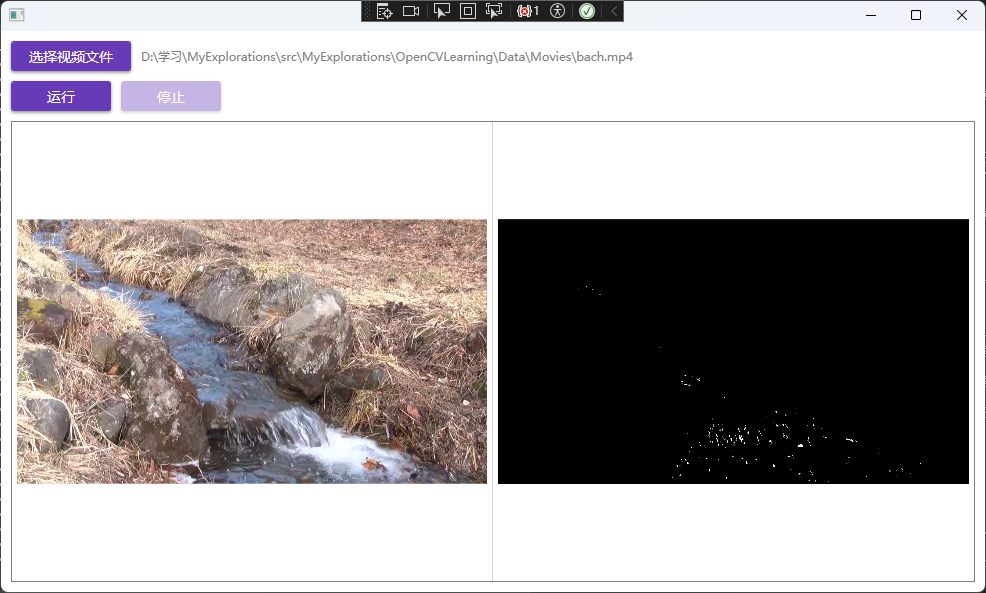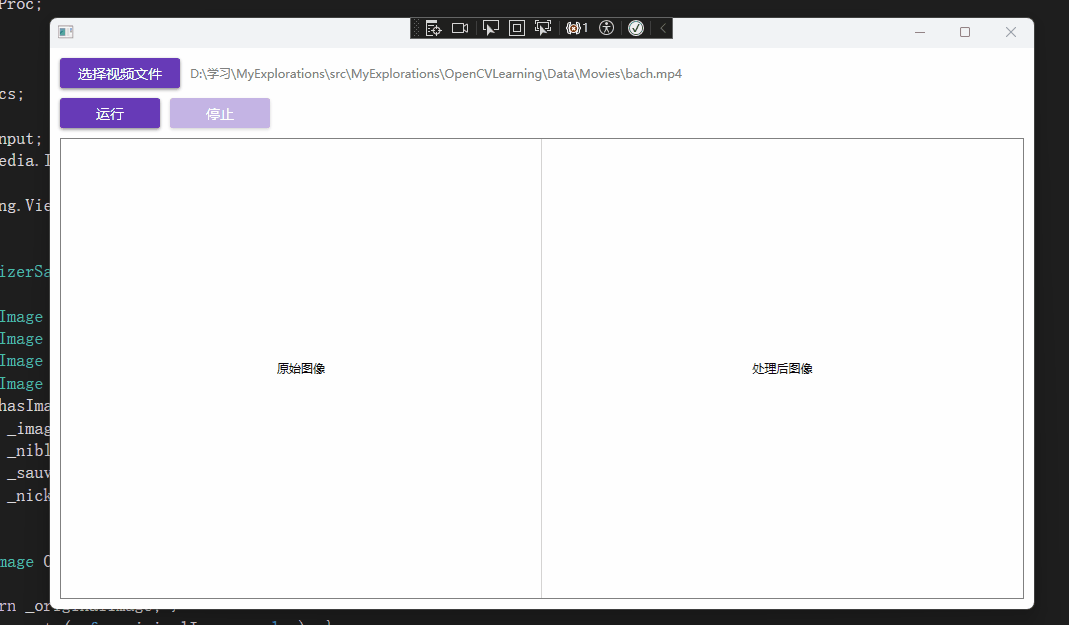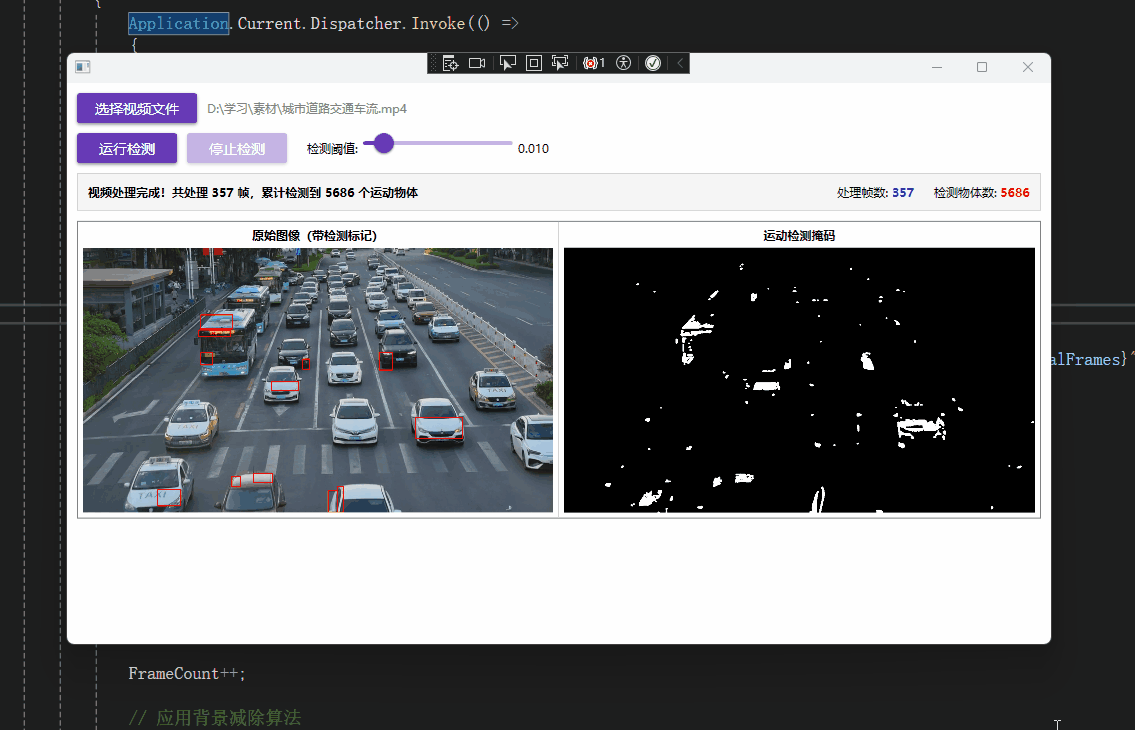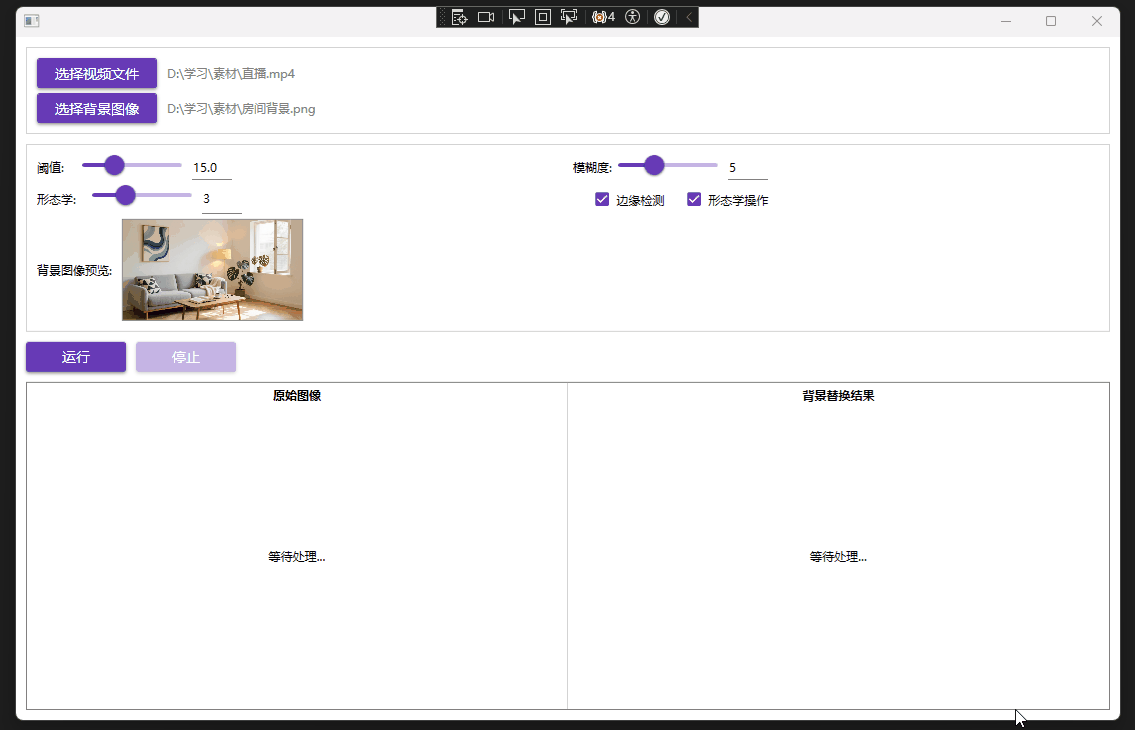OpenCVSharp:使用 MOG算法来从视频流中分离前景和背景
前言
今天来学习Samples中的第二个例子:使用 MOG(Mixture of Gaussians,高斯混合模型)算法来从视频流中分离前景和背景。
示例中的代码很短:
public override void RunTest()
{
using var capture = new VideoCapture(MoviePath.Bach);
using var mog = BackgroundSubtractorMOG.Create();
using var windowSrc = new Window("src");
using var windowDst = new Window("dst");
using var frame = new Mat();
using var fg = new Mat();
while (true)
{
capture.Read(frame);
if (frame.Empty())
break;
mog.Apply(frame, fg, 0.01);
windowSrc.Image = frame;
windowDst.Image = fg;
Cv2.WaitKey(50);
}
}
先从示例代码开始学习,然后再使用WPF做一个界面。
效果:

就这张效果图你可能不清楚在干嘛,但是一看动态的效果图你大概就懂分离前景和背景是什么意思了。

开始学习
using var capture = new VideoCapture(MoviePath.Bach);
创建了一个VideoCapture对象,这个是什么呢?
VideoCapture 是OpenCVSharp中用于视频捕获和读取的核心类,它提供了从多种视频源(包括摄像头、视频文件、网络流等)获取图像帧的统一接口。该类是计算机视觉应用中视频处理的基础组件,支持实时视频流处理和离线视频文件分析。
using var mog = BackgroundSubtractorMOG.Create();
BackgroundSubtractorMOG 是 OpenCV 中的一个背景减法算法,用于:
从视频流中分离前景和背景
检测运动物体
基于高斯混合模型(Mixture of Gaussians)进行背景建模
mog.Apply(frame, fg, 0.01); // 对每一帧应用背景减法
其中:
frame 是输入的视频帧
fg 是输出的前景掩码
0.01 是学习率参数
BackgroundSubtractorMOG又是什么呢?
BackgroundSubtractorMOG 是 OpenCvSharp 中实现基于高斯混合模型(Gaussian Mixture-based)的背景/前景分割算法的类。该类继承自 BackgroundSubtractor 抽象类,用于从视频序列中分离前景和背景对象。
高斯混合模型是一种无监督的聚类算法,它假设所有数据点都是由若干个不同的、符合高斯分布(正态分布)的模型“混合”生成的。它的目标就是找出这些高斯分布的最佳参数。刚入门学习,先当一名合格的掉包侠,知道这些算法在哪些场景下可以用到就行了,基本上都已经封装好了。
/// <summary>
/// Creates mixture-of-gaussian background subtractor
/// </summary>
/// <param name="history">Length of the history.</param>
/// <param name="nMixtures">Number of Gaussian mixtures.</param>
/// <param name="backgroundRatio">Background ratio.</param>
/// <param name="noiseSigma">Noise strength (standard deviation of the brightness or each color channel). 0 means some automatic value.</param>
/// <returns></returns>
public static BackgroundSubtractorMOG Create(
int history = 200, int nMixtures = 5, double backgroundRatio = 0.7, double noiseSigma = 0)
{
NativeMethods.HandleException(
NativeMethods.bgsegm_createBackgroundSubtractorMOG(
history, nMixtures, backgroundRatio, noiseSigma, out var ptr));
return new BackgroundSubtractorMOG(ptr);
}
Creat方法中提供了一组参数的默认值。
参数说明:
history: 历史帧长度,默认为 200 帧,较长的历史可以提供更稳定的背景模型,但会增加计算成本和内存使用。
nMixtures: 高斯混合数量,默认为 5,更多的混合成分可以更好地建模复杂背景,但会增加计算复杂度。
backgroundRatio: 背景比例,默认为 0.7,该值决定了哪些高斯成分被视为背景的一部分。
noiseSigma: 噪声强度(亮度或每个颜色通道的标准差),0 表示自动值,用于处理图像中的噪声,值越大对噪声的容忍度越高。
/// <summary>
/// the update operator that takes the next video frame and returns the current foreground mask as 8-bit binary image.
/// </summary>
/// <param name="image"></param>
/// <param name="fgmask"></param>
/// <param name="learningRate"></param>
public virtual void Apply(InputArray image, OutputArray fgmask, double learningRate = -1)
{
if (image is null)
throw new ArgumentNullException(nameof(image));
if (fgmask is null)
throw new ArgumentNullException(nameof(fgmask));
image.ThrowIfDisposed();
fgmask.ThrowIfNotReady();
NativeMethods.HandleException(
NativeMethods.video_BackgroundSubtractor_apply(ptr, image.CvPtr, fgmask.CvPtr, learningRate));
fgmask.Fix();
GC.KeepAlive(this);
GC.KeepAlive(image);
GC.KeepAlive(fgmask);
}
Apply方法更新背景模型并返回前景掩码。
参数:
image: 输入的视频帧
fgmask: 输出的前景掩码(8位二进制图像)
learningRate: 学习率,-1 表示使用自动学习率
这个例子中只用到了返回前景图像,我们应该也能猜得到肯定也能返回背景图像。
/// <summary>
/// computes a background image
/// </summary>
/// <param name="backgroundImage"></param>
public virtual void GetBackgroundImage(OutputArray backgroundImage)
{
if (backgroundImage is null)
throw new ArgumentNullException(nameof(backgroundImage));
backgroundImage.ThrowIfNotReady();
NativeMethods.HandleException(
NativeMethods.video_BackgroundSubtractor_getBackgroundImage(ptr, backgroundImage.CvPtr));
GC.KeepAlive(this);
GC.KeepAlive(backgroundImage);
backgroundImage.Fix();
}
功能: 计算并返回当前背景图像
参数:
backgroundImage: 输出的背景图像
做一个WPF应用
现在我们已经学习了基本用法,现在正好学习一下WPF,用WPF做一个简单应用。
根据这个示例做一个WPF应用可能需要注意的地方。
首先我们要注意的是图像的显示问题,在示例应用中是直接用Mat显示的,在WPF中显示图像一般用BitmapImage,那么这里就涉及到一个转换的问题,可以安装一下OpenCvSharp4.Extensions这个库,作者已经提供了一些转换方法。
private BitmapImage MatToBitmapImage(Mat mat)
{
// 将Mat转换为Bitmap
var bitmap = mat.ToBitmap();
// 将Bitmap转换为BitmapImage
var bitmapImage = new BitmapImage();
using (var stream = new System.IO.MemoryStream())
{
bitmap.Save(stream, System.Drawing.Imaging.ImageFormat.Bmp);
stream.Position = 0;
bitmapImage.BeginInit();
bitmapImage.StreamSource = stream;
bitmapImage.CacheOption = BitmapCacheOption.OnLoad;
bitmapImage.EndInit();
bitmapImage.Freeze();
}
return bitmapImage;
}
我们还注意到示例应用是一个死循环,没有办法停止,我们可以增加一个CancellationTokenSource来进行控制。
private CancellationTokenSource _cancellationTokenSource;
private async Task RunAsync()
{
IsProcessing = true;
HasProcessedImage = true;
_cancellationTokenSource = new CancellationTokenSource();
await Task.Run(() =>
{
using var capture = new VideoCapture(VideoPath);
using var mog = BackgroundSubtractorMOG.Create();
using var frame = new Mat();
using var fg = new Mat();
while (!_cancellationTokenSource.Token.IsCancellationRequested)
{
capture.Read(frame);
if (frame.Empty())
break;
mog.Apply(frame, fg, 0.01);
// 将Mat转换为BitmapImage并在UI线程更新
Application.Current.Dispatcher.Invoke(() =>
{
OriginalImage = MatToBitmapImage(frame);
ProcessedImage = MatToBitmapImage(fg);
});
Thread.Sleep(50); // 控制帧率
}
}, _cancellationTokenSource.Token);
IsProcessing = false;
}
全部代码:
<UserControl x:Class="OpenCVLearning.Views.BgSubtractorMOGView"
xmlns="http://schemas.microsoft.com/winfx/2006/xaml/presentation"
xmlns:x="http://schemas.microsoft.com/winfx/2006/xaml"
xmlns:d="http://schemas.microsoft.com/expression/blend/2008"
xmlns:mc="http://schemas.openxmlformats.org/markup-compatibility/2006"
xmlns:local="clr-namespace:OpenCVLearning.Views"
xmlns:prism="http://prismlibrary.com/"
mc:Ignorable="d"
prism:ViewModelLocator.AutoWireViewModel="True"
d:DesignHeight="450" d:DesignWidth="800">
<UserControl.Resources>
<BooleanToVisibilityConverter x:Key="BooleanToVisibilityConverter"/>
</UserControl.Resources>
<Grid Margin="10">
<Grid.RowDefinitions>
<RowDefinition Height="Auto"/>
<RowDefinition Height="Auto"/>
<RowDefinition Height="*"/>
</Grid.RowDefinitions>
<!-- 第一行:选择视频文件按钮和路径显示 -->
<StackPanel Grid.Row="0" Orientation="Horizontal" HorizontalAlignment="Left" Margin="0,0,0,10">
<Button Content="选择视频文件" Command="{Binding SelectVideoCommand}" Width="120" Height="30" Margin="0,0,10,0"/>
<TextBlock Text="{Binding VideoPath}" VerticalAlignment="Center" Foreground="Gray"/>
</StackPanel>
<!-- 第二行:运行和停止按钮 -->
<StackPanel Grid.Row="1" Orientation="Horizontal" HorizontalAlignment="Left" Margin="0,0,0,10">
<Button Content="运行" Command="{Binding RunCommand}" Width="100" Height="30" Margin="0,0,10,0"/>
<Button Content="停止" Command="{Binding StopCommand}" Width="100" Height="30"/>
</StackPanel>
<!-- 第三行:视频处理结果显示区域 - 分为两列 -->
<Border Grid.Row="2" BorderBrush="Gray" BorderThickness="1">
<Grid>
<Grid.ColumnDefinitions>
<ColumnDefinition Width="*"/>
<ColumnDefinition Width="*"/>
</Grid.ColumnDefinitions>
<!-- 左列:原始图像 -->
<Border Grid.Column="0" BorderBrush="LightGray" BorderThickness="0,0,1,0" Padding="5">
<Grid>
<Image Source="{Binding OriginalImage}" Stretch="Uniform"
Visibility="{Binding HasProcessedImage, Converter={StaticResource BooleanToVisibilityConverter}}"/>
<TextBlock Text="原始图像" HorizontalAlignment="Center" VerticalAlignment="Center"
Visibility="{Binding HasNoProcessedImage, Converter={StaticResource BooleanToVisibilityConverter}}"/>
</Grid>
</Border>
<!-- 右列:处理后图像 -->
<Border Grid.Column="1" BorderBrush="LightGray" Padding="5">
<Grid>
<Image Source="{Binding ProcessedImage}" Stretch="Uniform"
Visibility="{Binding HasProcessedImage, Converter={StaticResource BooleanToVisibilityConverter}}"/>
<TextBlock Text="处理后图像" HorizontalAlignment="Center" VerticalAlignment="Center"
Visibility="{Binding HasNoProcessedImage, Converter={StaticResource BooleanToVisibilityConverter}}"/>
</Grid>
</Border>
</Grid>
</Border>
</Grid>
</UserControl>
using Microsoft.Win32;
using OpenCvSharp;
using OpenCvSharp.Extensions;
using Prism.Commands;
using Prism.Mvvm;
using System;
using System.IO;
using System.Threading;
using System.Threading.Tasks;
using System.Windows;
using System.Windows.Input;
using System.Windows.Media.Imaging;
namespace OpenCVLearning.ViewModels
{
public class BgSubtractorMOGViewModel : BindableBase
{
private string _videoPath;
private BitmapImage _originalImage;
private BitmapImage _processedImage;
private bool _hasProcessedImage;
private bool _isProcessing;
private CancellationTokenSource _cancellationTokenSource;
public string VideoPath
{
get { return _videoPath; }
set { SetProperty(ref _videoPath, value); }
}
public BitmapImage OriginalImage
{
get { return _originalImage; }
set { SetProperty(ref _originalImage, value); }
}
public BitmapImage ProcessedImage
{
get { return _processedImage; }
set { SetProperty(ref _processedImage, value); }
}
public bool HasProcessedImage
{
get { return _hasProcessedImage; }
set
{
SetProperty(ref _hasProcessedImage, value);
RaisePropertyChanged(nameof(HasNoProcessedImage));
}
}
public bool HasNoProcessedImage
{
get { return !_hasProcessedImage; }
}
public bool IsProcessing
{
get { return _isProcessing; }
set
{
SetProperty(ref _isProcessing, value);
RaisePropertyChanged(nameof(CanRun));
RaisePropertyChanged(nameof(CanStop));
}
}
public ICommand SelectVideoCommand { get; private set; }
public ICommand RunCommand { get; private set; }
public ICommand StopCommand { get; private set; }
public BgSubtractorMOGViewModel()
{
SelectVideoCommand = new DelegateCommand(SelectVideo);
RunCommand = new DelegateCommand(async () => await RunAsync(), CanRun).ObservesProperty(() => VideoPath).ObservesProperty(() => IsProcessing);
StopCommand = new DelegateCommand(Stop, CanStop).ObservesProperty(() => IsProcessing);
}
private void SelectVideo()
{
OpenFileDialog openFileDialog = new OpenFileDialog
{
Filter = "视频文件|*.mp4;*.avi;*.mov;*.mkv;*.wmv;*.flv|所有文件|*.*",
Title = "选择视频文件"
};
if (openFileDialog.ShowDialog() == true)
{
VideoPath = openFileDialog.FileName;
}
}
private bool CanRun()
{
return !string.IsNullOrEmpty(VideoPath) && File.Exists(VideoPath) && !IsProcessing;
}
private bool CanStop()
{
return IsProcessing;
}
private void Stop()
{
_cancellationTokenSource?.Cancel();
}
private async Task RunAsync()
{
IsProcessing = true;
HasProcessedImage = true;
_cancellationTokenSource = new CancellationTokenSource();
await Task.Run(() =>
{
using var capture = new VideoCapture(VideoPath);
using var mog = BackgroundSubtractorMOG.Create();
using var frame = new Mat();
using var fg = new Mat();
while (!_cancellationTokenSource.Token.IsCancellationRequested)
{
capture.Read(frame);
if (frame.Empty())
break;
mog.Apply(frame, fg, 0.01);
// 将Mat转换为BitmapImage并在UI线程更新
Application.Current.Dispatcher.Invoke(() =>
{
OriginalImage = MatToBitmapImage(frame);
ProcessedImage = MatToBitmapImage(fg);
});
Thread.Sleep(50); // 控制帧率
}
}, _cancellationTokenSource.Token);
IsProcessing = false;
}
private BitmapImage MatToBitmapImage(Mat mat)
{
// 将Mat转换为Bitmap
var bitmap = mat.ToBitmap();
// 将Bitmap转换为BitmapImage
var bitmapImage = new BitmapImage();
using (var stream = new System.IO.MemoryStream())
{
bitmap.Save(stream, System.Drawing.Imaging.ImageFormat.Bmp);
stream.Position = 0;
bitmapImage.BeginInit();
bitmapImage.StreamSource = stream;
bitmapImage.CacheOption = BitmapCacheOption.OnLoad;
bitmapImage.EndInit();
bitmapImage.Freeze();
}
return bitmapImage;
}
}
}
应用
我们大概知道怎么使用了之后,关键是要知道在哪些场景下可能会用到这个东西,现在我们可以配合AI去测试一下几个可能能用上的场景。
我测试了两个场景,一个是运动物体检测,另一个是背景图像转换。
运动物体检测效果:

可以发现其实结果也不是很准确,也是比较一般。
背景图像转换效果:

可以发现其实效果不是很好,现在直播背景图像替换可能更推荐MediaPipe Selfie Segmentation与OpenCV结合起来。
虽然说这两个Demo效果不是很好,但是可以学习一些OpenCVSharp的用法。




 浙公网安备 33010602011771号
浙公网安备 33010602011771号